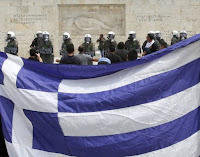DER TAGESSPIEGEL, May 6th
“The future of Europe may have been decided in a bank branch in Athens. The day before yesterday it was perhaps possible to look at the financial crisis in the southeastern tip of Europe with a Teutonic coolness … that is over. This is not about money any more. It is about much more. Peoples’ deaths have changed things…“
 My Greekness has always been a source of reflection. I have a natural in-born tendency to oppose “belonging.” Having lived most of my adult life outside Greece, I have often wondered where “home” is.
My Greekness has always been a source of reflection. I have a natural in-born tendency to oppose “belonging.” Having lived most of my adult life outside Greece, I have often wondered where “home” is.
But while the schema of my Greekness is blurry, the indisputable fact remains that so many people who matter to me are there today. And suddenly, and only yesterday, I made a discovery: As the news of the deaths and the massive protests in Athens unfolded, I found myself mourning.
I still can’t faithfully express what it is I am silently crying for. Greece – in all of its instability, frailty, intoxicating and irrational joviality, breathtaking natural beauty tantalizingly blemished by infuriating man-made urban ugliness, pollution, traffic, bureaucracy and stubborness of contemporary Greeks to see things more objectively and less narrowly – yes, this Greece is mine. My memories – the sun, the Aegean, the sunsets on the Saronic gulf, my childhood, my feelings, my early life there belong to me.
But somehow, I can’t connect my present with my past. I am afraid and I don’t even know why. My daughter, mother and a number of my closest and most dear friends are in Greece. And I have trouble visualizing the prospects, the future, the hopes and the dreams – and cursed are those who fail to dream.
While I am a pragmatist, I am also a positive boundary pusher who strongly believes in moving on and forward. But today, I am stumped. I don’t seem to get it. As a mother, I find myself concerned with my daughter’s physical safety – and I have never been this kind of a “jumpy” mother. Will my mother’s pension be enough? Who of my friends will not survive the job losses? Where will the inner strength and inspiration come from? And what happens when hope is lost, when civil society breaks down and the most basic of the basics – security, physical and financial – is threatened?
And where am I in all this? While I comfortably sit in sunny, peaceful and deceptively safe California, the Greek crisis – beyond its political, economic and geophysical implications – is affecting my soul. Today, I cry for Greece. It is my turn to mourn the death of innocence and brightness – and I need the time to think what role I will choose to play in this drama – how I can help – because I cannot simply sit and watch and just worry.
“Challenges make life interesting, however, overcoming them is what makes life meaningful,” said the wisest Mark Twain – all we need to do is to have the courage to stand up and do something about it.

Leda Karabela’s career focus has been building alliances with and among institutional stakeholders, which spans 25 years of experience in international management, public affairs, strategic marketing and philanthropy. Her primary focus has been external audiences, such as opinion leaders, media, customers, and donors.
Today, she is bringing her executive experience into the field of coaching, realizing her passion for people, the ways they click and connect with each other, helping clients discover the power within them to improve their performance, effectiveness and reach. Having held responsibilities for global projects and working with virtual teams in multiple countries for Fortune 50 companies such as BP and Microsoft, she has also led the corporate relations program at the Stanford University Graduate School of Business and has lived in Boston, San Francisco, London, Athens and Dubai.








